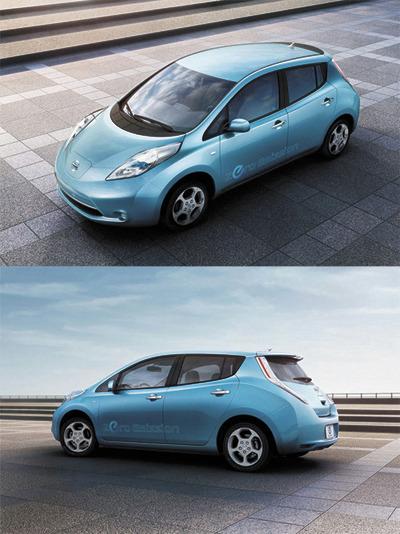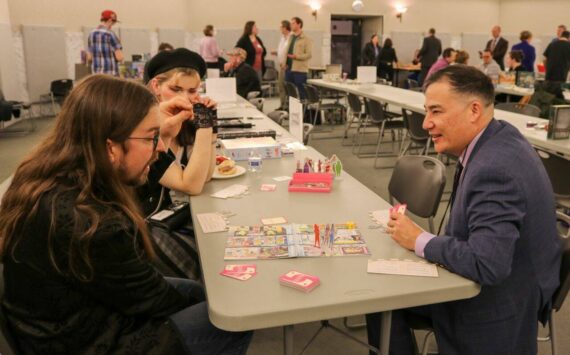The City of Tacoma’s fleet of vehicles will soon be a little more eco-friendly thanks to action taken last week at City Hall. On Jan. 25, Tacoma City Council approved a purchase resolution to award a contract to Columbia Ford Lincoln Mercury Nissan in Longview, Wash., in order to purchase 10 2011 Nissan Leaf electric vehicles, 11 2010 Ford Fusion hybrid vehicles, and 70 2011 Ford Crown Victoria Police Intercept vehicles.
In a Dec. 22, 2010 memo to the city’s board of contracts and awards, Public Works Director Richard E. McKinley noted the Nissan Leaf automobiles would replace outdated city parking management vehicles, add additional vehicles to the city’s motor pool fleet, and add two vehicles for staff at the Center for Urban Waters facility. The Ford Fusion hybrid automobiles would replace less fuel efficient and out-dated fleet vehicles already scheduled to be replaced. And the Ford Crown Victoria automobiles would replace wrecked patrol vehicles and vehicles no longer feasible to maintain. A grant from the Environmental Protection Agency will provide charging stations at City Hall, Center for Urban Waters, and the city’s fleet vehicle parking garage.
The purchase resolution first appeared on the agenda during city council’s Jan. 18 meeting, However, City Council postponed its decision so it could spend an additional week studying the proposal. At issue during the Jan. 18 meeting was the criteria to replace existing fleet vehicles. According to fleet services manager Frederick Chun, the lifecycle of city vehicles is based on the costs of maintenance and number of miles driven. Typically, a fleet vehicle lasts 11 years, and a police car lasts eight years or 100,000 miles. “Ninety-nine per cent of the city vehicles are purpose-built, function-specific,” Chun explained. “It is heavily used every day with lots of miles, lots of idling time.” As an example, he pointed to the condition of several police cars. “We’ve deferred replacement of our police cars for about a year or two. So these vehicles are in dire need of replacement at this time.”
But Councilmember Ryan Mello joined several of his colleagues when he asked whether replacing fleet vehicles based on the eight-year or 11-year standards made sense regardless of the vehicle’s mileage or age. “A car that hits 100,000 miles today is very different than a car that hit 100,000 miles 10 years ago,” said Councilmember Mello. “Manufacturers are building better, more long-lasting vehicles. Are we able to stretch taxpayer dollars longer because of better technology, because of better manufacturing? That’s the thing I’ve been wrestling with since seeing the purchase resolution on our agenda.”
Another concern for some councilmembers was spending $330,000 on 10 Nissan Leaf electric vehicles instead of Toyota Prius hybrid vehicles, which are approximately $7,000 cheaper — and thus would save the city $70,000. “I can appreciate where we want to be a leader and we want to set an example, but I’m having trouble seeing a $7,000 difference between a Leaf and a Prius,” said Councilmember Joe Lonergan. “It’s a difficult pill to swallow, especially at this time in our finances.”
But Councilmember Jake Fey argued that moving toward all-electric vehicles like the Leaf and away from electric-gas hybrid vehicles like the Prius could pay off in the long-term. “Seven-thousand dollars may seem like quite a bit at this point in time,” he said. “But we’re very dependent upon petroleum prices and those costs, and people are talking these days about $4- and $5-per-gallon gasoline being just around the corner. So I would like to see an analysis that shows some assumptions with increasing petroleum costs versus very modest increases in electricity costs.”
The debate was taken up again last week before council finally voted on the purchase resolution. A motion was made and approved to amend the purchase resolution by removing the element specifically related to purchasing the Nissan Leaf vehicles so it could be discussed and voted on separately.
Councilmember Marty Campbell said that he was excited to see electric vehicles added to the city’s fleet, but was concerned about purchasing 10 vehicles at once. “The current rotation cycle is 11 years,” he said. “I think back to the cell phone I had in 2000 and what my cell phone is like today and all the advancements that happened along that time and how much I had to upgrade that. What I would prefer to see us do is perhaps look at getting five to six at this point and then as more product lines come out — Ford rolls theirs out, the Chevy Volt comes out — we look at some of those and keep staggering them in and make sure we’re positioned across the broad spectrum with the diversity of the market.”
Councilmember David Boe, who introduced the motion to amend the resolution, wanted to study the issue further. “When we’re looking at making significant purchases like this — and to our average constituent, if you can pay $9,000 more per vehicle that is comparable — wow, where is the payback on that?” said Councilmember Boe. “I want to see where that is. I understand the whole focus and we want purchasing to be thinking this way and that will be applauded. But we also have to be very smart. Sometimes we can get in a loop where it is really cool. We don’t want to do things that are cool. We want to do things that are smart and have incredible value so we can say to our constituents, ‘Yes, here is the payback on it, these are real numbers, and this is why it is.’ Then it is like, ‘Ah, that makes sense. That is a better way to self-sustainability with the real hard value aspect.'”
But Councilmember Victoria Woods joined a majority of her colleagues by applauding the plan. “I think it has not been said any clearer than sometimes you have to put your money where your mouth is and that is what we’re doing,” she said. “We talk about sustainability and this is actually doing less talking and doing the walking. So I will be supporting this tonight.”
In the end, council approved the larger purchase resolution by a vote of 8 to 0, and approved purchasing the Nissan Leaf electric vehicles by a vote of 5 to 3.
During Tacoma City Council’s meeting Jan. 25, several councilmembers commented on the purchase resolution before taking a vote. Here are some of their comments, which have been edited for space.
COUNCILMEMBER MARTY CAMPBELL
I was excited to see electric vehicles come forth. Two or three years ago, before gas prices spiked, if you mentioned electric vehicles, people didn’t know what you were talking about or thought you were talking about something way out in the future. Just last year, when I brought forth [the idea of getting] more electric vehicles and electric golf carts on our streets, it was met with a certain amount of ‘we’re not ready for that yet.’ Here we are less than a year later and already we’re looking at the purchase of 10 Nissan Leafs. I think that is great, but I think as we get into adding electric vehicles to our fleet we really need to step back and take a look at how we’re doing it because electric vehicles are not like regular cars.
I don’t know if we yet understand the lifecycle or what direction we need to go in with the Leafs. I want to thank staff for all their hard work on this and what we brought forth. I think we have done a lot of studying into this, but we need to do a little bit more. We got a cost comparison that shows the estimated electricity cost over the life of a vehicle to be $2,200 to $3,600 for a Leaf compared to $7,900 to $13,000 in gasoline costs for a hybrid vehicle. However, some of those calculations are done upon national modeling which has electricity prices that are much higher than the electricity prices we have here. And based on the electricity prices provided in another part of the package I have, it will be $400 or $500, at least from what I am seeing here. That is why I want to slow down and have a conversation about this.
The other thing that concerns me is getting so many of the Leafs at once. The current rotation cycle is 11 years. I think back to the cell phone I had in 2000 and what my cell phone is like today and all the advancements that happened along that time and how much I had to upgrade that.
What I would prefer to see us do is perhaps look at getting five to six at this point and then as more product lines come out — Ford rolls theirs out, the Chevy Volt comes out — we look at some of those and keep staggering them in and make sure we’re positioned across the broad spectrum with the diversity of the market.
I don’t believe we will continue to see cheap gas. I think three dollars will be considered cheap gas in the future and in the future, we will be thankful we have electric vehicles in our fleet. But I want to make sure we find a way to maximize and put them throughout our entire system.
I would also hope that we can work on modifying our purchasing program. These cars are being shipped out of Longview, Wash. I understand that is part of the state contract and that is the way that many of these large fleet purchases happen. But I would like to look at a way where we can purchase them from dealers in our community. I think that is important when you talk about life cycle and sustainability. I would hate to think that cars that are being built in the midwest are shipped to Longview and back up to Tacoma. That really isn’t helping us with our life cycle.
I would like to step back, really take a more solid plan, and make sure that not only do we have an electric vehicle program that we’re proud to put the Tacoma name on, but it is one of the best in the nation.
COUNCILMEMBER DAVID BOE
A lot of times when it comes to sustainability, my only personal bias is people go into fashion and not go into smarts. When we’re looking at making significant purchases like this — and to our average constituent, if you can pay $9,000 more per vehicle that is comparable — wow, where is the payback on that? I want to see where that is. I understand the whole focus and we want purchasing to be thinking this way and that will be applauded. I don’t want to take Councilmember Mello’s cheerleading out of this because that is really important, but we also have to be very smart. Sometimes we can get in a loop where it is really cool. We don’t want to do things that are cool. We want to do things that are smart and have incredible value so we can say to our constituents, ‘Yes, here is the payback on it, these are real numbers, and this is why it is.’ Then it is like, ‘Ah, that makes sense. That is a better way to self-sustainability with the real hard value aspect.’
COUNCILMEMBER JOE LONERGAN
I have some concerns about this and the charging station wrinkle adds to my concerns when we look at the costs. I would have a great deal of difficulty spending an extra $7,000 to $9,000 on a vehicle in my household, especially when I am financing and paying interest on that additional money just because it’s a fun or cool or example thing to do. So I have trouble spending an extra $7,000 to $9,000 of your money on a vehicle and then adding in the charging stations which may or may not be free to us. I am struggling with that.
I am also struggling a little bit with the idea of trading our dependence on one rare commodity, being fossil fuels, for a dependence on another rare resource — the minerals that are used for the batteries of these vehicles and the components of these vehicles — and I am not sure how comfortable I am with that and not sure that the questions around that have been answered to my satisfaction. I do know that recently China restricted their shipments of rarest minerals, which is where most of them come from, to Japan. They didn’t restrict their shipments to the U.S. but it was a wake-up call to us to find some other sources rather than sole-sourcing those out of China. And we found some other sources out of Africa which may or may not be a great place to be getting those from, or a reliable place to get those from. I think we’re going to end up with a lot of the same concerns about how we fuel our cars, whether it is a battery or a fossil fuel, and what the social impacts of those are.
The biggest thing is just the dollars and cents. When you add it all up, it’s the same cost except it will cost us more right now to buy one, the Leaf, and we’re going to pay interest on that versus the over-the-years cost of the Prius.
There are a lot of unanswered questions. We don’t know how much a replacement battery costs or if we need one. So I have a lot of questions on this. I want to be a leader. I want to be going forward. But I also have to be responsible with your money and the money of our taxpayers.
COUNCILMEMBER LAUREN WALKER
Everything I have done on the council for the last three years has been talking about sustainability and we have this fabulous staff that has been really working toward the city’s goals. The last two meetings, both at the study session and council meetings, staff have asked many, many questions about the Leaf and I have been satisfied with the answers. So I would rather think of myself as forward thinking and having true faith of where we’re going. I would like to lead by example with sustainability. We’re talking about 10 electric cars and I really am proud of that. I am not supporting the Leaf because, as David says, that is cool. I have been reading about these cars for years and years and am excited about them coming.
COUNCILMEMBER RYAN MELLO
I, for one, look forward to the next-generation vehicle with more sustainability measures. I think this is the very beginning and I hope I am never put in a position to vote for a traditional vehicle but that we’re voting for cleaner cars and supporting that technology with our pocketbook as well as our other actions.
I just want to tell a brief story why I think this is good for our fleet. I came yesterday to City Hall to do some business in the morning. I was leaving the building in the morning to get a cup of coffee — and this is not to get anybody in trouble, Mr. City Manager, this is simply illustrating the need — I was walking out of the building and I found a city worker on her way to — it looked like she was going to collect change out of all the parking pay stations. She had a big huge van, like a 12-passenger van. She parked it right in front of the building, kept it idling, got out of the van to do her business, probably removed the change and moved on to the next pay station, collect the money, move on to the next pay station — idling, I will add. If this van were a clean car and electric vehicle, it couldnt be emitting any carbon in the atmosphere and it wouldn’t be so bad that it was left idling while she was doing her city business collecting change out of the pay stations. So to illustrate the need of our city workers who do the city business every day, every hour, running around town, doing these simple tasks. They are really important tasks, but these kinds of cars will make it so what they burn off is not harmful to citizens.
We talk about non-sustainment and I will remind my colleagues 50 percent of our emissions are because of transportation sources in Tacoma and albeit [these are just 10 vehicles], it is a great start, we will have more in the future, and we have to start somewhere.
So I think being a market leader is incredibly important. We’re positioned, I am told by staff, to get 100 charging stations and it is because of the City of Tacoma leading the way that others are going to follow. There are lots of examples where we are put in a position to lead the market and lead the way and for that, I am grateful to the staff and city manager and I really hope we have more purchase resolutions on this progressive path leading the way.
COUNCILMEMBER JAKE FEY
There has been some discussion about costs. Members of the audience that are watching here at City Council Chambers or at home don’t have the information probably that we have in front of us. I want to start there.
The information presented to me shows there is a $5,700 additional cost for the cost to fuel these vehicles if we go with the Prius because of the higher cost of gasoline. And we have lower maintenance costs of another approximate $5,000. So that, in my mind, offsets the $8,000 difference in the front end costs of the vehicles.
Now, in addition to that, since we talked about borrowing and interest costs, I also translate that to be a positive cash flow for the dollars that are being spent because we are borrowing this over time. So the actual cost over the lifespan that we borrow the money, we will be in a net positive situation by purchasing the Leafs.
Now, it is all based on assumptions, but we actually have control on some of the assumptions because we’re the ones that approved the electric rates. How much control does a political body have on the price of petroleum? Not much. It is probably the most difficult commodity to predict based on circumstances that are well out of virtually everyone’s control except for the oil companies and countries that control production of petroleum. So I feel confident I can control my fuel costs in the future by purchasing electricity. Besides, the electricity we’re purchasing for this is a very clean electricity, generated by hydroelectric power for the most part. So it is a clean fuel source for our vehicles.
I think ten vehicles isn’t that far out there. I don’t think it is that substantial a thing for us to be patting ourselves on the back for. Lots of other jurisdictions have done this, and more. That is not to say I am going to discount what we’re doing today, but I think it is a very believable and appropriate thing for us to do.
Councilmember Mello talked about non-sustainment. That is a factor. There are additional environmental costs. If we look at the additional production of petroleum and its impact, we don’t come close to counting in the cost of gasoline what the environmental impacts are. We’re not close to that. It is a subsidized price we’re paying. Other countries have prices closer to what the environmental impacts are.
So for that reason, and also for, I think, a very important reason of elected officials living up to the commitment, we can say a lot in policy but when the rubber meets the road, so to speak in this case, we need to act on our policies and that is what I believe I will be doing today by voting for this.
COUNCILMEMBER VICTORIA WOODARDS
I will be supporting the resolution to purchase these ten vehicles tonight. I think it has not been said any clearer than sometimes you have to put your money where your mouth is and that is what we’re doing. We talk about sustainability and this is actually doing less talking and doing the walking. So I will be supporting this tonight.
MAYOR MARILYN STRICKLAND
To reiterate what I said earlier, we, as a city, made a commitment to sustainability and it is not done because it is cool or in fashion but because it makes sense in the long run and I think that is what this is about. I don’t think buying 10 vehicles will break the bank, and the discrepancy between the different prices, we can compare features and pricing on any single purchase we do and take things off the agenda all the time and talk about it in committee. I don’t think this is appropriate. The whole idea of electric vehicles being this newfangled technology isn’t actually true. They have been around a long time but are now finally being brought to market because our dependence on oil will not last forever.
I respect the efforts of Councilmember Lonergan, Campbell and Boe to take another look at this. We can think of a long-term strategy like cities like San Francisco, Los Angeles, and Portland have done, but it doesn’t mean we don’t talk about it further. So I am ready to support this tonight. I am ready to vote.










